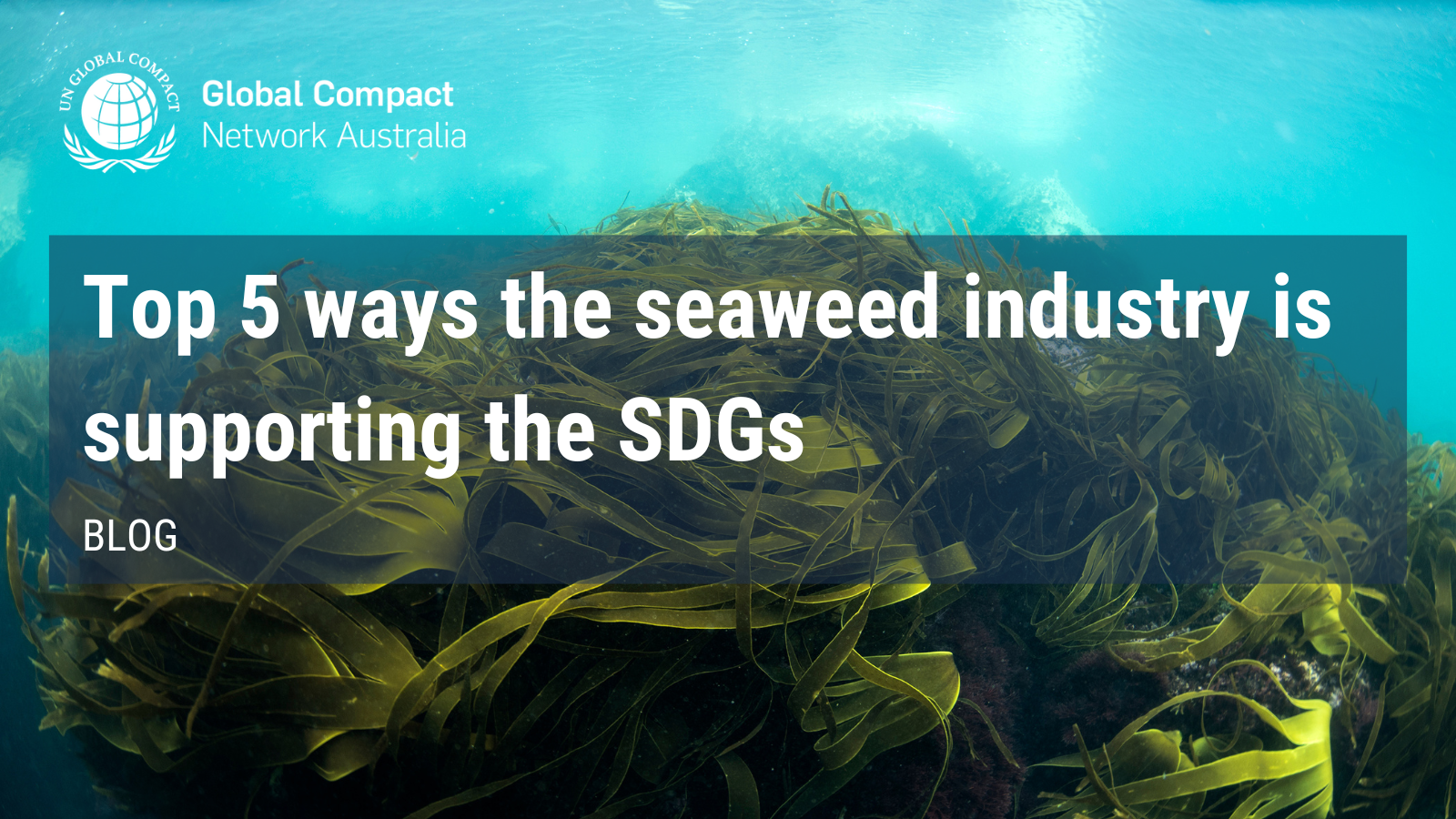
Blogs, Featured, Media, News, Sustainable Development Goals
BLOG | Top 5 ways the seaweed industry is supporting the SDGs
Nick O’Sullivan | February 15, 2023
The seaweed industry is fast emerging as a huge growth opportunity for Australia’s blue economy, by providing a range of sustainability services and benefits for business and the community.
Exciting innovations from the seaweed industry are creating new solutions for businesses to reduce their environmental impacts throughout their supply chains. These solutions include reducing waste, improving water quality and reducing greenhouse gas (GHG) emissions, thereby contributing to the achievement of a number of the UN Sustainable Development Goals (SDGs).
The Australian Sustainable Seaweed Alliance (ASSA) supports industry collaboration to unlock the vast potential benefits that seaweed can bring to our economy and our planet. We sat down with the Chair of ASSA, Jo Kelly, to learn more about key innovations in the seaweed industry and the top five ways they are contributing to the SDGs.
- 1. Methane reduction from livestock
Methane emissions from ruminant livestock, like cattle and sheep, are a major contributor to global GHG emissions. Methane is a particularly potent GHG that is 28 times more powerful than carbon dioxide. The CSIRO tells us that current emissions from livestock make up around 15% of the world’s entire GHG emissions.
Scientists at the CSIRO have collaborated with academics and industry over many years to develop the intellectual property (IP) for a native Australian seaweed that can be used to significantly reduce methane production in ruminants by adding it to their feed. This is through a species of seaweed, called Asparagopsis, that has the potential to reduce the amount of methane produced by cattle by over 80%.
The CSIRO-led company, FutureFeed, has now licenced a number of companies around the world to enable them to produce Asparagopsis-based feed additives, including ASSA members CH4 Global and SeaForest. CH4 Global were recently named on the 2023 Global Cleantech 100 as an exceptional innovator in the race to net zero. Meanwhile, SeaForest recently partnered with national burger chain Grill’d to produce a beef burger with up to 67% less methane emissions reported from the beef production.
![]()
- 2. Carbon uptake
Another benefit of growing seaweed is its capacity for carbon uptake from the marine environment. Oceans have absorbed significant amounts of carbon dioxide and excess heat from human activities. But this process has caused warming of oceans, acidification and oxygen loss with resulting negative impacts on marine ecosystems.
Seaweeds are able to grow extremely fast and absorb substantial amounts of carbon in doing so. Through this uptake of excess carbon, seaweed cultivation can buffer the impacts of carbon dioxide increase on our oceans.
Methods are being investigated to then sink cultivated seaweed to the seafloor, storing a portion of the carbon for the long-term. This approach could make a contribution to climate action as a nature-based solution, and one that is hugely scalable.
However, when seaweed is harvested for use as a food, feed or fertiliser, stored carbon is released back to the atmosphere, which means these uses are generally not suitable for long-term carbon sequestration. Nevertheless, new methods are being developed to use harvested seaweed as a bioplastic, or biochar in ways which would sequester the carbon long-term. The Southern Ocean Carbon Company is one company investigating these methods.

- 3. Improving water quality
Seaweed has the ability to absorb nutrients like nitrogen, phosphorous and heavy metals out of the water – acting as a natural ‘biofilter’. This not only keeps our oceans cleaner, but certain species can be utilised in areas like the Great Barrier Reef to absorb nitrogen runoff that has been severely impacting reef health. The Australian Seaweed Institute is working on ways to establish biofilters around the Great Barrier Reef using species including Asparagopsis.
The filtering ability of seaweed can also provide a water treatment solution for aquaculture and municipal wastewater. Queensland-based company Pacific Bio are developing ways to use Asparagopsis and green algae to filter unwanted nutrients out of urban wastewater treatment plants.
Pacific Bio and other companies like Seasol and New Zealand company AgriSea also turn seaweed into a potent biofertiliser which reduces the use of synthetic fertilisers that contribute to water pollution in the first place.

- 4. Bioplastics
The physical properties of some seaweeds enable them to be used as alternative materials for all sorts of applications, including bioplastics. Plastic pollution is a serious issue in our oceans, and seaweed offers the opportunity for both edible and biodegradable bioplastics to replace petroleum-based products.
Notpla, a London based company, were recently awarded Prince William’s Earthshot Prize for their material made from seaweed and plants that disappears naturally.
Perth-based company ULUU recently made headlines with their seaweed-based bioplastic that boasts some pretty impressive credentials. The plastic replacement is said to be both carbon negative (as its production offsets more carbon than is emitted) and is home-compostable and biodegradable if it enters the ocean.

- 5. Food and nutrition
Seaweed has long been used as a source of food in various cultures around the world – many of us have probably tried seaweed in the form of nori used in sushi, or wakame common in Japanese cuisine. Seaweed is high in fibre, iodine and a number of other nutrients like omega-3 fatty acids.
Seaweed is a versatile ingredient that can not only add nutrition to meals and dietary supplements, but can also be used as an alternative protein – with some seaweeds containing up to 45% protein.
Showing us truly how versatile seaweed can be, American company Umaro Foods have developed a seaweed-based bacon substitute, while Akua are producing kelp-based burgers packing 12g of protein along with all the nutritional benefits of seaweed.
Closer to home, Australian companies such as Alg Seaweed, SeaHealth and PhycoHealth produce an interesting range of seaweed food products including seaweed chocolate, snacks, salt and seasonings.
In Tasmania, Marinova are a biotechnology company and global leaders in a seaweed extract called fucoidan that is used in nutraceuticals and skincare products with a range of health benefits.

If you’re interested to learn more about how this exciting industry can contribute to your organisation’s sustainability journey, register (in-person or online) for the upcoming Seaweed Innovation Showcase and Networking Event, hosted by ASSA where you will hear from some of the companies mentioned above, and more.
Seaweed Innovation Showcase & Networking Event
- Tue 21st Feb 2023, 5:30 pm – 7:30 pm AEDT
- Hotel Grand Chancellor Hobart
This event takes place alongside the 24th International Seaweed Symposium, also in Hobart as well as online. You can find out more about the symposium here.




